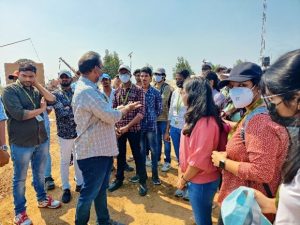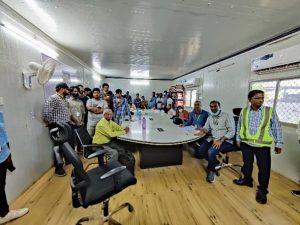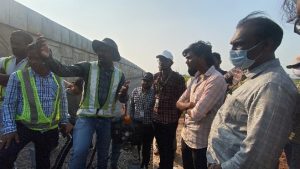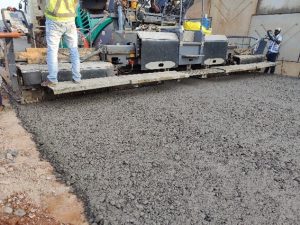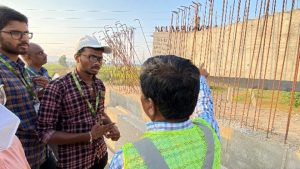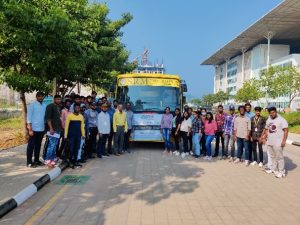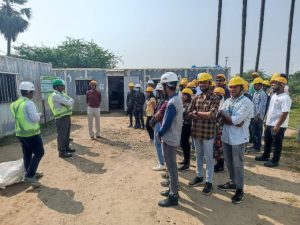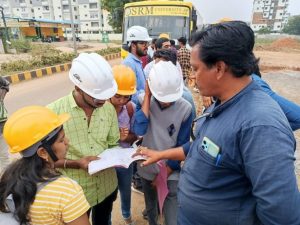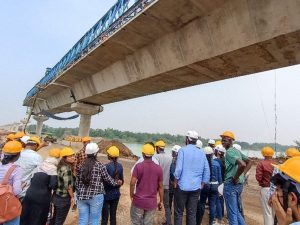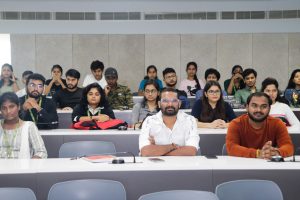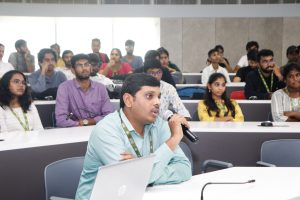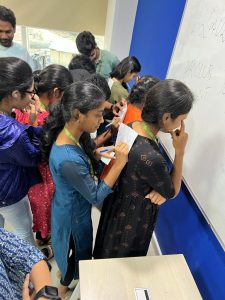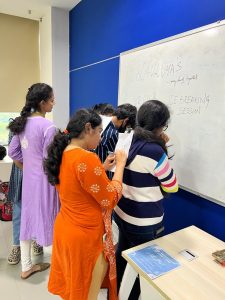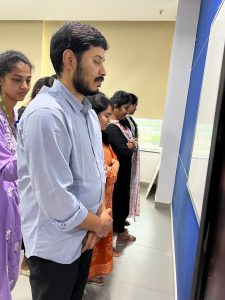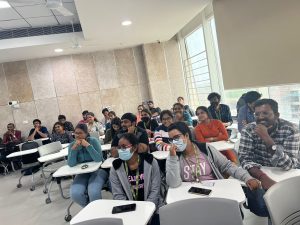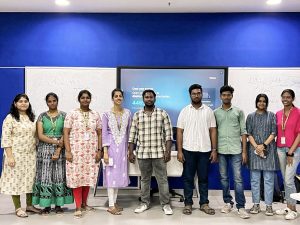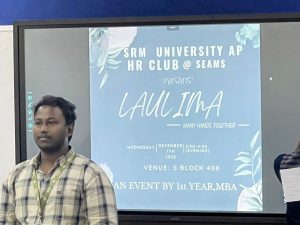All Management News
- Aadigyan-Indian Immersion Programme for Students of UTP Malaysia December 28, 2022
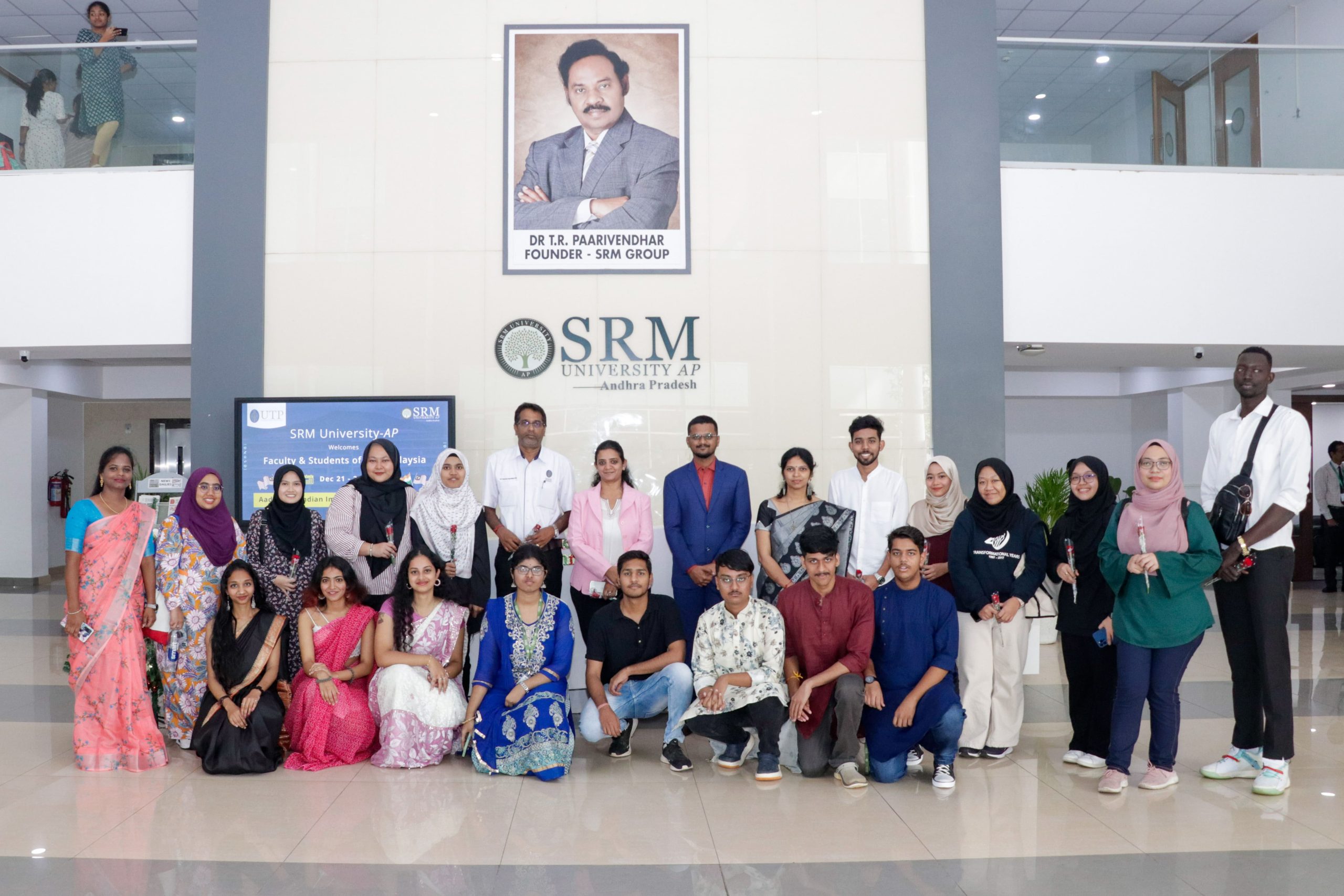 SRM University-AP welcomed the students and faculty of the Universiti Teknologi PETRONAS (UTP), Malaysia, to the rich cultural landscape of India through the Aadigyan-Indian Immersion programme 2022. The one-week-long programme conducted by the Directorate of International Relations and Higher Studies was inaugurated by the honourable Vice Chancellor of SRM University-AP, Prof. Manoj K Arora. Aadigyan is a flagship initiative of the university to promote India’s cultural and knowledge traditions.
SRM University-AP welcomed the students and faculty of the Universiti Teknologi PETRONAS (UTP), Malaysia, to the rich cultural landscape of India through the Aadigyan-Indian Immersion programme 2022. The one-week-long programme conducted by the Directorate of International Relations and Higher Studies was inaugurated by the honourable Vice Chancellor of SRM University-AP, Prof. Manoj K Arora. Aadigyan is a flagship initiative of the university to promote India’s cultural and knowledge traditions.Dr Naga Swetha Pasupuleti, Associate Director of the Directorate of International Relations and Higher Studies, received the international students at the grand inaugural ceremony of the programme. Students participated in various short courses on Data Analysis, Samaj Seva, the Art of Negotiation & Digital Marketing offered by the Paari School of Business. They also got to visit the famous landmarks of Vijayawada, such as the Dhyana Buddha statue, Prakasham Barrage, Kondapalli, etc. The traditional toy-making practice enticed the Malaysian student cohort.
Students interacted with many industry experts as they visited Infosys Gachibowli, Hyderabad campus, which gave them insights regarding the current trends and new technologies. The programme also included interaction with the 160+ International students of SRM AP from more than 29 countries over RRR Movie Screening and Gala Night. The programme ended on December 26, 2022, with a valedictory session and facilitating faculty and students of UTP Malaysia.
Continue reading → - Industrial Visit to MEIL December 27, 2022
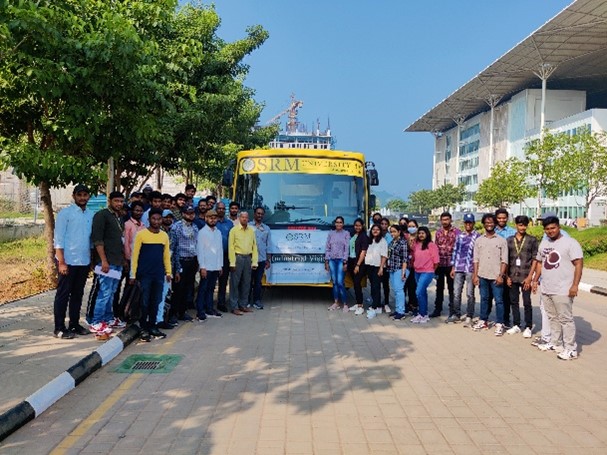
The Department of Civil Engineering has organised an industrial visit to Megha Engineering & Infrastructure Limited (MEIL) for engineering students to harbour them with the practical skillsets demanded by profession. The field visit was guided by senior engineers working on respective sites and co-ordinated by the faculty.
Project: Six-Laning of Vijayawada Bypass from Chinna Autupalli (Design Ch. 0.000) to Gollapudi (Design Ch. 30.000) Section of NH-16
Construction Company: Megha Engineering & Infrastructures Limited (MEIL)
Visit Highlights:
- Safety training by MEIL
- Quality Control Lab tour
- Soil, Aggregate, Bitumen, and Cement Concrete Testing
- Quality Control Aspects
- Batching Plant visit
- WMM and Concrete batching plants
- Site Tour
- Earthworks, Embankment, and WMM Construction
Coordinating faculty: Dr A Uma Maheswar
Continue reading → - Industry Visit for Hands-on Exposure December 27, 2022
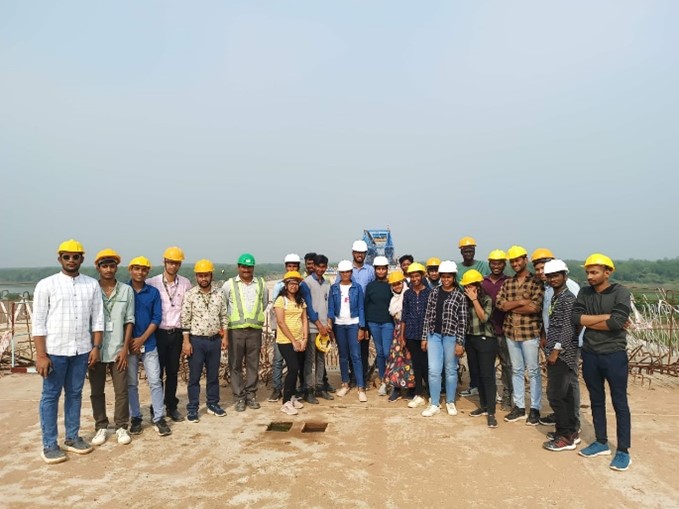
The Department of Civil Engineering of SRM University-AP conducted the second industrial visit for the Civil Engineering students of all semesters on November 30, 2022.
Details of the industrial site
An 18-kilometre stretch bridge over the Krishna River in the Chinakakani-Gollapudi highway is under construction jointly by the Adani group and Navayuga Engineering Company Limited. Hands-on practical insight was provided by experienced site Engineers on the topic of the post-tensioned precast bridge and the launching arrangement of each precast segment using advanced technological equipment. Students were also exposed to the different units of the site (i.e., the Safety class was delivered by the site officials, the Concrete batching plant, Quality control laboratories, and the Casting yard of the precast units).
Coordinating faculty: Dr Nishant Sharma and Dr Arijit Saha
Continue reading → - Estimating ACEs among Young Adults in Kashmir December 26, 2022
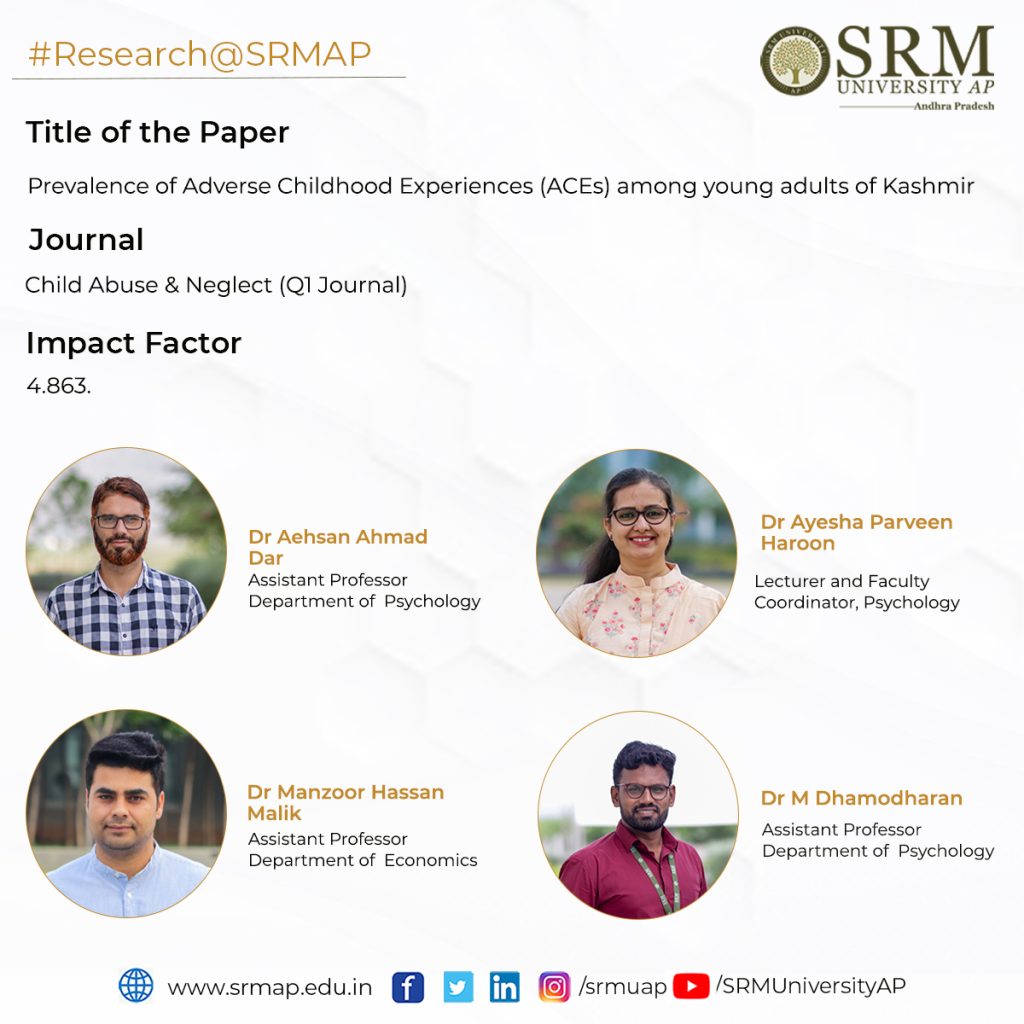
The Faculty of Psychology and Economics have jointly published a paper titled “Prevalence of Adverse Childhood Experiences (ACEs) among young adults of Kashmir” in the Q1 Journal Child Abuse & Neglect, having an impact factor of 4.863. Dr Aehsan Ahmad Dar, Assistant Professor, Department of Psychology; Dr Manzoor Hassan Malik, Assistant Professor, Department of Economics; Dr Ayesha Parveen Haroon, Lecturer, Department of Psychology; Dr Dhamodharan M, Assistant Professor, Department of Psychology have worked on interpreting the emotional constraints that are harboured among the young adults experiencing the adversities in turbulent Kashmir.
Abstract
The present study estimated the prevalence of ACEs among young adults studying in the colleges and universities of Kashmir, India. Findings disclosed that 15.4 % of the students reported high exposure to ACEs, 13.4% of the participants reported high exposure to ACEs, 26.3 % of the sample reported moderate exposure to ACEs, 33.0 % of the youth reported low exposure to ACEs and 11.8 % of the respondents reported no exposure to ACEs. The prevalence of ACEs was found to be 88.2 % (females: 82.7 % and males: 90.8 %) with a mean of 4.72 adverse events during childhood. The ACEs with the highest level of prevalence were “often or very often insulted or put down” (49.8 %), followed by “often or very often hurt physically” (47.6 %), “often or very often pushed, grabbed, or slapped” (41.6 %), “lived with a mentally ill household member” (28.3%), “touched or sexually fondled” (25.3 %),” household member being into the prison” (25.0%) and “witnessed father or mother being pushed, grabbed, slapped, or had something thrown at them” (24.0%).
Practical Implementation of the Research
The findings of the study will serve as a reliable source for healthcare professionals, policymakers and NGOs to better understand the impact of ACEs on the health and well-being of individuals. Since ACEs are associated with several immediate and long-term health hazards, therefore, necessary efforts in this direction are suggested to advocate the early targeted intervention to reduce ACEs and their impact as well as design effective measures to improve the health and well-being of young adults, thereby reducing the development of physical and mental disorders.
Collaborations
- Prof. Sibnath Deb, Rajiv Gandhi National Institute of Youth Development, Sriperumbudur, Tamil Nadu, India.
- Dr Manzoor Hassan Mali, Department of Economics, SRM University-AP, Andhra Pradesh, India
- Prof. Waheeda khan, Department of Clinical Psychology, Faculty of Behavioural Sciences, Shree Guru Gobind Singh Tricentenary University, Budhera, Gurugram, Delhi-NCR, India.
- Dr Ayesha Parveen Haroon, Department of Psychology, SRM University-AP, Andhra Pradesh, India
- Dr Amra Ahsan, Department of Clinical Psychology, Faculty of Behavioural Sciences, Shree Guru Gobind Singh Tricentenary University, Budhera, Gurugram, Delhi-NCR, India
- Dr Farhat Jahan, Department of Clinical Psychology, Faculty of Behavioural Sciences, Shree Guru Gobind Singh Tricentenary University, Budhera, Gurugram, Delhi-NCR, India
- Dr Bushra Sumaiya, Faculty of Education, Shree Guru Gobind Singh Tricentenary University, Budhera, Gurugram, Delhi-NCR, India.
- Shaheen Yawar Bhat, Department of Physiology, All India Institute of Medical Sciences, New Delhi, India.
- Dr Dhamodharan M, Department of Psychology, SRM University-AP, Andhra Pradesh, India
- Mohamad Qasim, Independent Researcher
The research cohort plans to study youth’s mental health and ascertain its risk and protective factors. About 19% of the world’s children live in India, which constitutes 42% of the total Indian population, and nearly half of these children are vulnerable and need care and protection. Due to various traumatic experiences, stress has increased among young people resulting in various physical and mental disorders.
The research will focus on the pathogenic (post-traumatic stress disorder, depression, anxiety, somatisation) and salutogenic (post-traumatic growth and resilience) consequences of trauma to help the youth withstand adverse experiences and develop psychological competence. The research will provide insights into the mental health of youth that would be helpful for the administration, policymakers, and other voluntary organisations to understand effective ways to devise and implement the best intervention programs for maximising mental health protective factors and minimising its risk factors.
Continue reading → - Employing Information Entropy in Determining the Water Body’s Health Status December 26, 2022
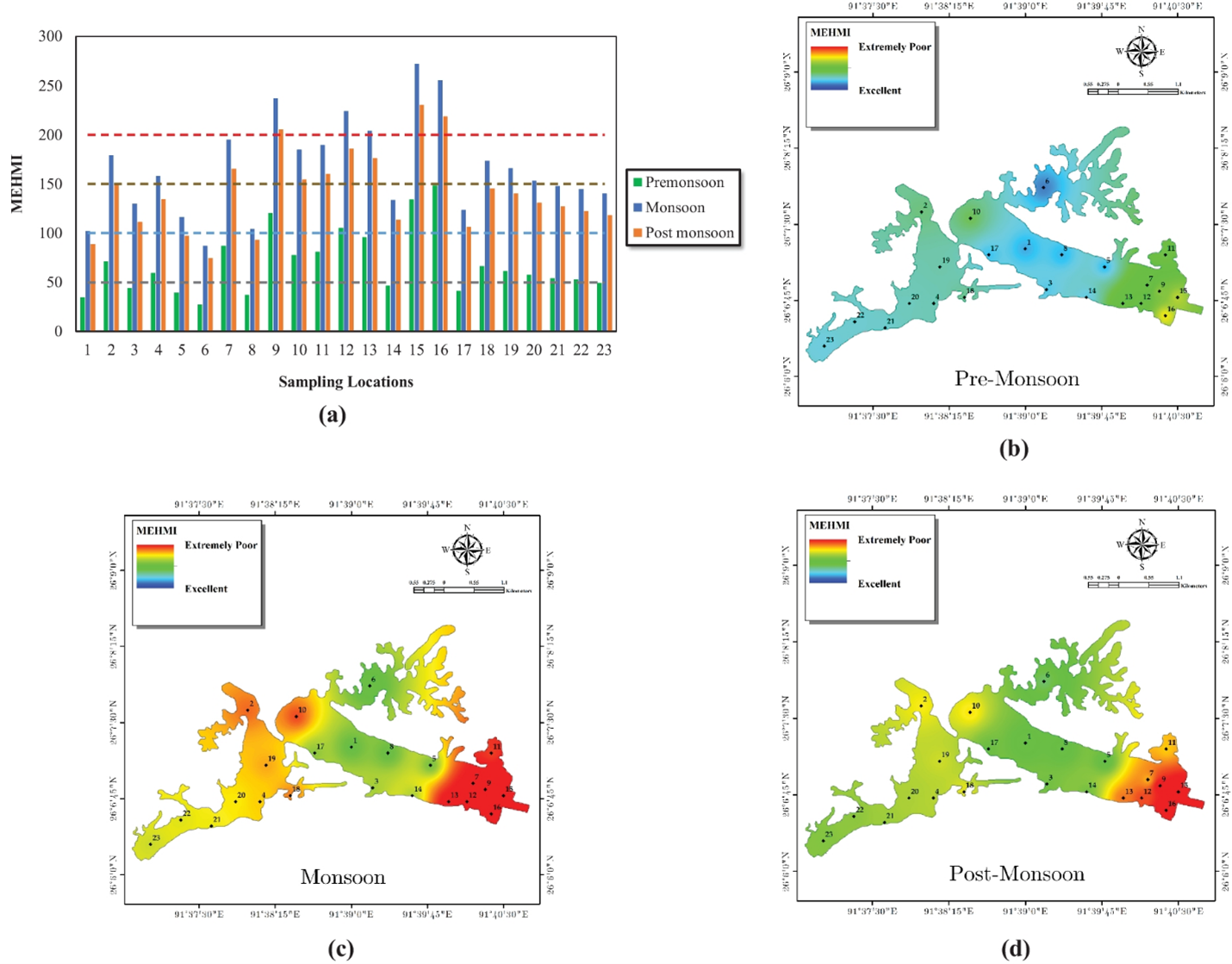 The global population is changing drastically, increasing at an alarming rate of more than 80 million per year. This growing population has led to enormous pressure on land-use patterns and, to a greater extent, the natural ecosystems, especially water bodies. The water bodies are getting depleted considerably, and their quality is significantly deteriorating. Assistant Professor Dr Siddhanth Dash from the Department of Civil Engineering has published the paper Development of function-specific indices for assessing water quality based on the proposed modifications of the expected conflicts on existing information entropy weights in the journal Environmental Monitoring and Assessment with an impact factor of 3.307. He has collaborated with Dr Ajay S Kalamdhad, a Professor at the Department of Civil Engineering, IIT Guwahati, for the research.
The global population is changing drastically, increasing at an alarming rate of more than 80 million per year. This growing population has led to enormous pressure on land-use patterns and, to a greater extent, the natural ecosystems, especially water bodies. The water bodies are getting depleted considerably, and their quality is significantly deteriorating. Assistant Professor Dr Siddhanth Dash from the Department of Civil Engineering has published the paper Development of function-specific indices for assessing water quality based on the proposed modifications of the expected conflicts on existing information entropy weights in the journal Environmental Monitoring and Assessment with an impact factor of 3.307. He has collaborated with Dr Ajay S Kalamdhad, a Professor at the Department of Civil Engineering, IIT Guwahati, for the research.Explanation in Layperson’s Terms
Waterbody contamination is attributed to a various number of reasons: primarily anthropogenic contamination, such as extensive industrial (small as well as large-scale) discharges, leaching of chemical fertilisers from the agricultural grounds, the release of toxic chemicals such as heavy metals and pesticides, and discharge of untreated sewage water from residential complexes (primary constituents being nutrients such as N, P, and K and pathogens). These depletions of the natural water systems have affected the entire aquatic ecosystem. Indexing tools have proved to be the most significant of all the techniques developed. Water quality indices (WQIs) are mathematical representations of a particular body’s water quality, providing a singular numeric denomination reflecting its health status. Specific indices are unique indices which provide information regarding the overall anthropogenic contamination and are broadly target-specific. Over the years and extensive studies carried out worldwide, while multivariate statistics have proved its reliability, the existing approach of using entropy weights suffers from various ambiguities.
Dr Dash’s study addresses vital issues relating to the existing use of entropy weights in WQIs, thus proposing a novel approach to employing information entropy in determining the water body’s health status.
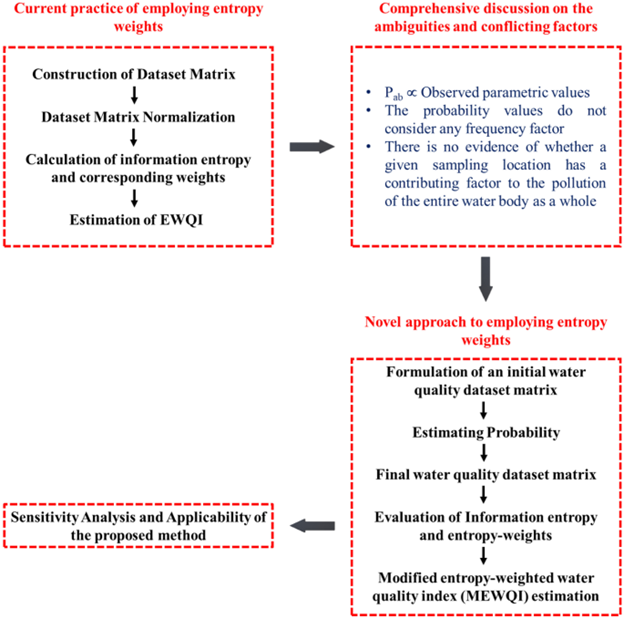 Practical Implementation and Social Implication of the Research
Practical Implementation and Social Implication of the ResearchWater quality assessment remains paramount when providing safe and potable water as per the United Nations Sustainable Development Goals (SDGs). This study’s results would pave the way for a more reliable and time-conserving manner of assessing water quality and a broader context and health status of a water body that will help protect and preserve different water bodies globally. The present study will also benefit the researchers and policymakers in making sustainable decisions toward restoring water bodies and preventing them from plausible future deterioration.
Working on sustainable and effective treatment techniques to remediate emerging contaminants in aquatic ecosystems is the future research plan of Dr Dash.
Abstract
Water serves numerous purposes besides drinking, such as irrigation and industrial usage. Most water quality indices developed have primarily focused on drinking water quality. However, assessing other functionalities of water bodies is also equally essential. The present study proposes a novel technique to measure water quality for two highly specific water use, i.e., assessing heavy metal contamination and irrigation suitability. The ambiguities in the current practice of entropy weights were identified, and a novel method was proposed, considering a three-dimensional approach instead of the conventional two-dimensional procedure. Weights to different parameters were assigned based on the probability estimates obtained from the frequency of observed values within acceptable limits. The proposed method’s reliability, correctness, and applicability were tested using Deepor Beel’s water quality dataset. Results were highly consistent with the experimental values and correlated well with other established methods. The efficacy of the method was determined by employing sensitivity analyses. Both indices showed high reliability and correctness, as no single parameter was found to be highly sensitive compared to others. Therefore, the proposed methodology proved to be the most reasonable, incorporating all the factors required for a reliable water quality monitoring program.
Citation of the Article
Dash, S., & Kalamdhad, A. S. (2022). Development of function-specific indices for assessing water quality based on the proposed modifications of the expected conflicts on existing information entropy weights. Environmental Monitoring and Assessment, 194(12), 1-17.
Continue reading → - A Critical Analysis of Faith-based Healing December 26, 2022
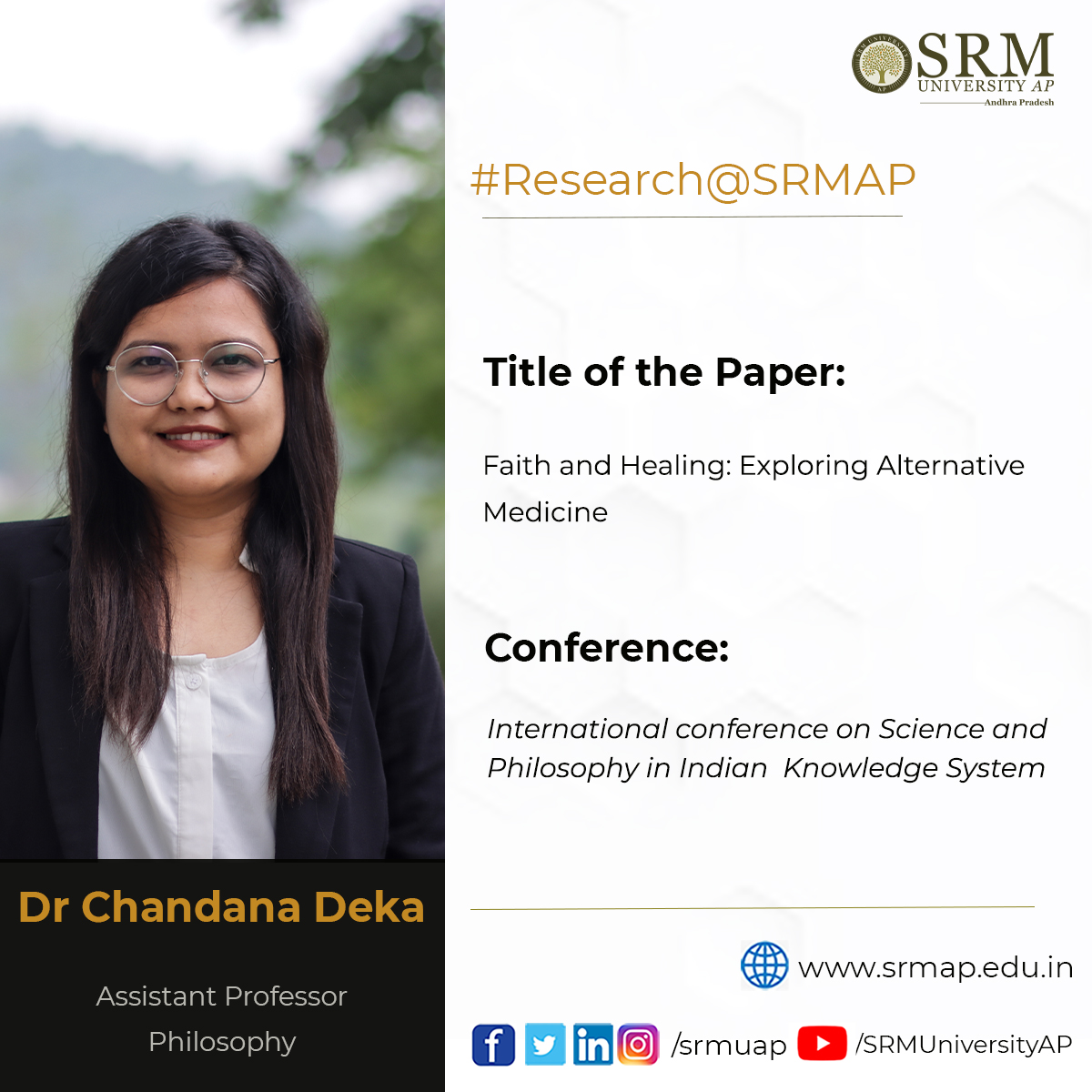 Dr Chandana Deka from the Department of Liberal Arts presented a paper titled Faith and Healing: Exploring Alternative Medicine at the international conference on Science and Philosophy in Indian Knowledge System organised by the Institute for Science and Spirituality Delhi in partnership with Noida International University IKS Division, Ministry of Education, Govt. of India from December 17 to 18, 2022. Her paper has also been published as part of conference proceedings.
Dr Chandana Deka from the Department of Liberal Arts presented a paper titled Faith and Healing: Exploring Alternative Medicine at the international conference on Science and Philosophy in Indian Knowledge System organised by the Institute for Science and Spirituality Delhi in partnership with Noida International University IKS Division, Ministry of Education, Govt. of India from December 17 to 18, 2022. Her paper has also been published as part of conference proceedings.Abstract
Fideism is a school of thought that gives importance to faith as against reason in matters related to religion. Fideism is defined as “the view that religious belief systems are not subject to rational evaluation” (Peterson, 2003). But matters related to religion do not confine only to the transcendental aspects of religion, it also impacts and influences the socio-cultural and ethical aspects (Durkheim, 1912). In this paper, the researcher discusses one such socio-cultural aspect of religious faith, that is, religious healing. Faith-based healing is often considered one form of alternative medicine (Andrew Village, 2005). In this paper, she explores this faith-based healing and contends that not all forms of faith-based healing can be appropriated. She tries to give a theoretical justification as to which forms of faith-based healing can be adopted and which need not be. The research is analytical and critical in nature based on materials that include books and articles written on fideism and different religious Texts.
Continue reading → - CXO Eminent Speakers’ Series: Mr Deepak Gupta on Global Business Scenarios December 26, 2022
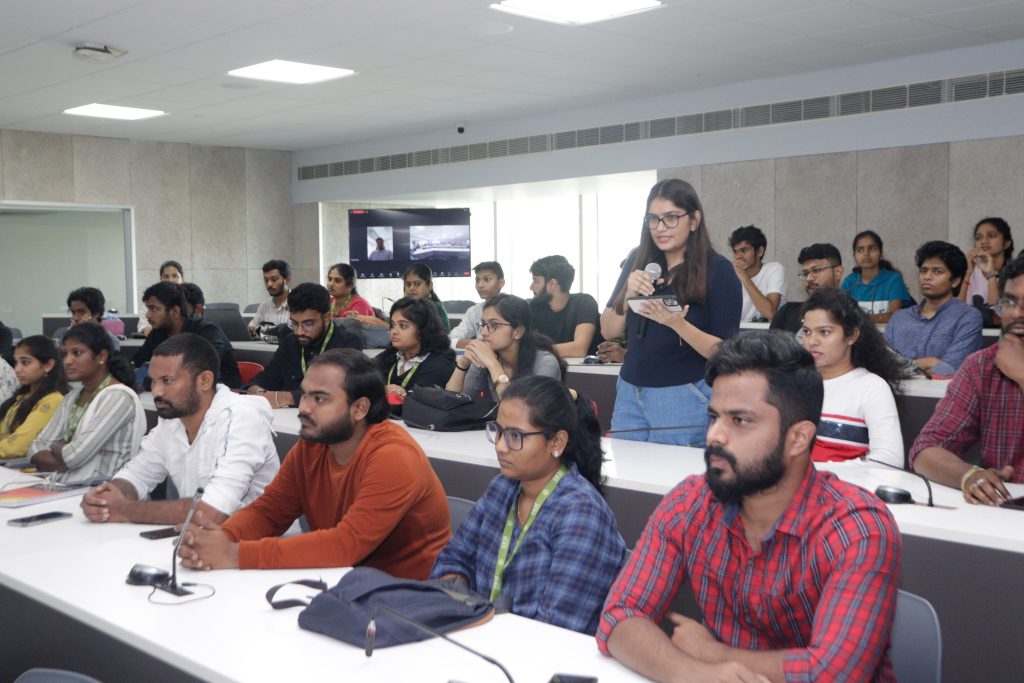
Under the ambit of the CXO Eminent Speakers’ Series, Paari School of Business organised the first virtual guest session on December 13, 2022. Mr Deepak Gupta, Country Head, Zotac Limited, Mumbai, a leading gaming enterprise, addressed the students of BBA and MBA programmes. The theme of his talk was “Global Business Scenarios: Q & A”. Given the unprecedented global changes and business transformation, Mr Gupta shared insights about how businesses are increasingly coping with emerging technological changes and innovations. From disruptive supply chain to strategic human capability, from consumer insights to finance and investing to digital leadership fronts, all demanding significant attention, and advancements for growth and sustainability for the planet, people, and profit. The session was well received by the students and faculty members.
Continue reading → - HR Club-Laulima organises “A Welcome to the Freshers” December 26, 2022
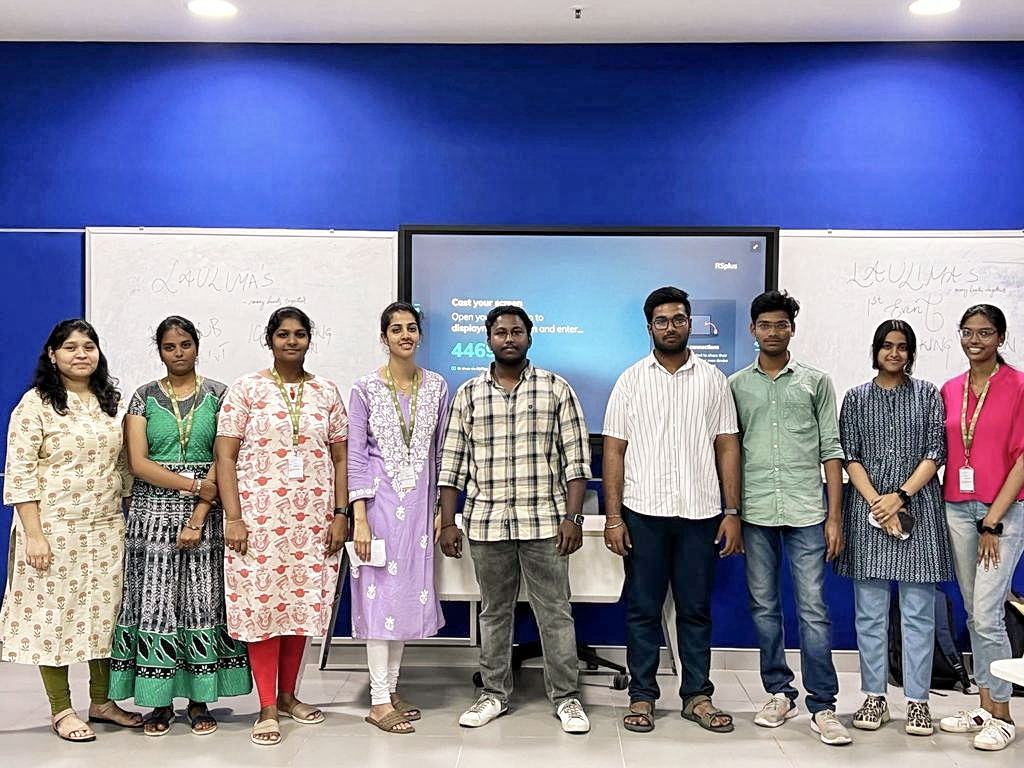
The Paari School of Business is an inclusive academic community that embraces modern perceptions while embracing the originality of past notions. To welcome the new recruits into the management abode, the HR Club – Laulima organised their maiden event “Ice-breaking session: Getting to know each other” on December 07, 2022 at the New Academic Block of the university. The student coordinators of BBA and MBA, with the support and guidance of faculty members, jointly organised the event for the participants from the first-year MBA students.
The Ice-breaking session featured games and activities which enabled participants to mingle with each other for the first time. It helped them build rapport with their batch-mates and was very well received by all participants. Moreover, it was an excellent opportunity for the student coordinators to learn and organise such an event with successful execution. The student coordinators also thanked the faculty members, HODs, and the respected Dean of Paari School of Business, Prof. Bharadhwaj Sivakumaran for their constant support and motivation to take the initiative and believe in ‘learning by doing’.
Continue reading → - SRM University-AP Walks Off with the Prestigious Accolade December 22, 2022
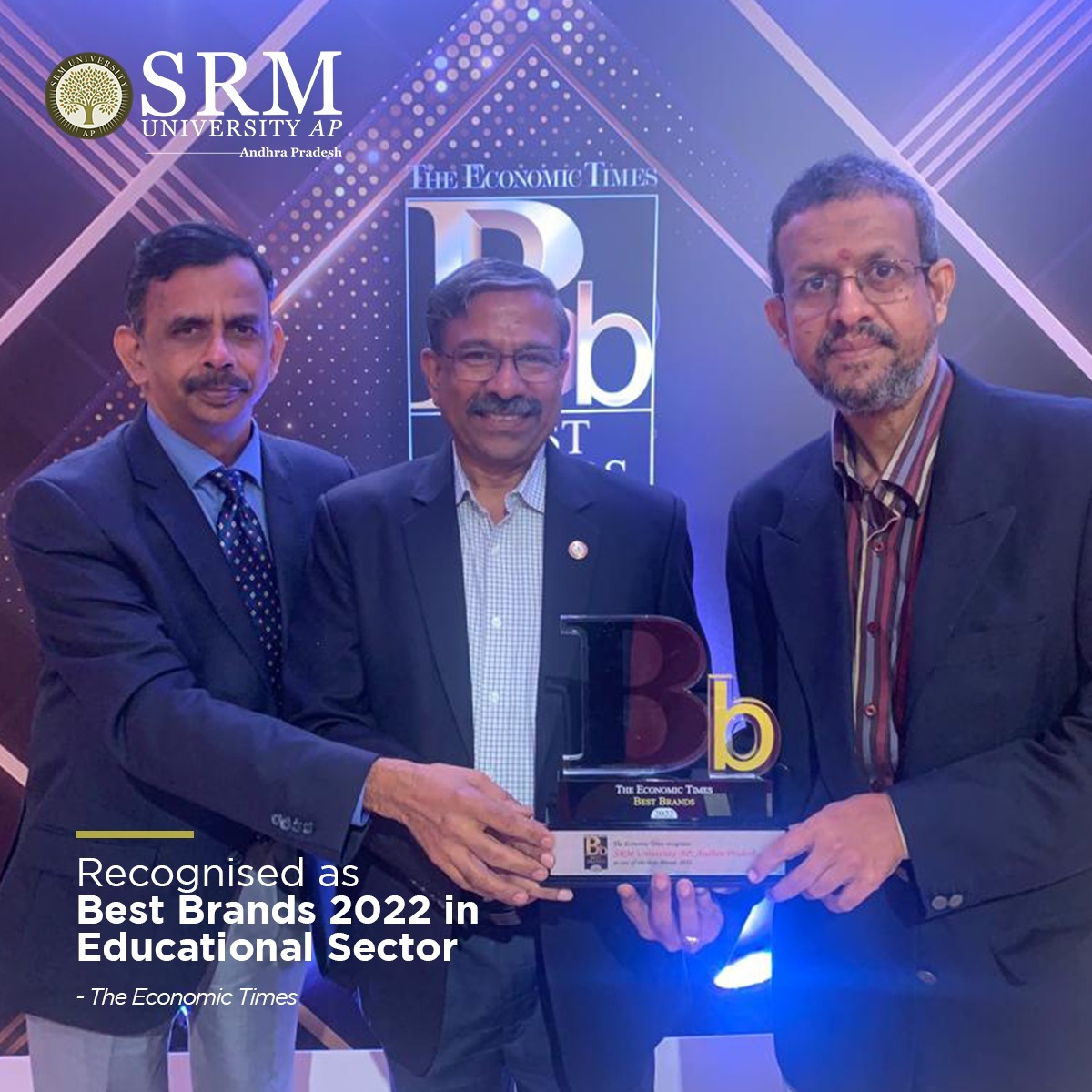 SRM University-AP has been bestowed with the prestigious Best Brand Award 2022 at the fifth edition of The Economic Times Best Brands Conclave held on December 20, 2022, at Taj Lands End, Mumbai. Mr Harsh C Mariwala, Chairman of Marico, handed over the award to Dr R Premkumar, Registrar; Prof. Bharadhwaj Sivakumaran, Dean, Paari School of Business; and Mr Pankaj Belwariar, Director, Communications, of SRM AP. The award is conferred to brands that have transformed their present structure, conditioned the future course of action, and delivered value to all their customers by constantly innovating.
SRM University-AP has been bestowed with the prestigious Best Brand Award 2022 at the fifth edition of The Economic Times Best Brands Conclave held on December 20, 2022, at Taj Lands End, Mumbai. Mr Harsh C Mariwala, Chairman of Marico, handed over the award to Dr R Premkumar, Registrar; Prof. Bharadhwaj Sivakumaran, Dean, Paari School of Business; and Mr Pankaj Belwariar, Director, Communications, of SRM AP. The award is conferred to brands that have transformed their present structure, conditioned the future course of action, and delivered value to all their customers by constantly innovating.“SRM University-AP has established a solid brand value within a short span of time in the education industry. Best Brand Award 2022 is a huge honour for the institution, and we will strive to enrich and uphold this recognition for years to come,” said Prof. Manoj K Arora, Vice Chancellor, SRM AP, as he expressed his thoughts on being at the receiving end of the esteemed award.To recognise leading Brands for the financial year 2021-2022, Economic Times researched the parameters laid down by the Knowledge Partner, which included brand value, years of existence, annual turnover, minimum growth rate, brand recall value, and the number of employees among other notable achievements, according to which the brands were evaluated and chosen. SRM University-AP has been shortlisted as one of the Economic Times Best Brands of 2022 and was honoured with a certificate of appreciation. The glorious award ceremony featured remarkable brands which have redefined the benchmark in their respective fields through their legacy and sustainability in India and global markets.
Continue reading → - When Innovation meets Compassion: Dr Sunitha’s Noble Initiative December 21, 2022
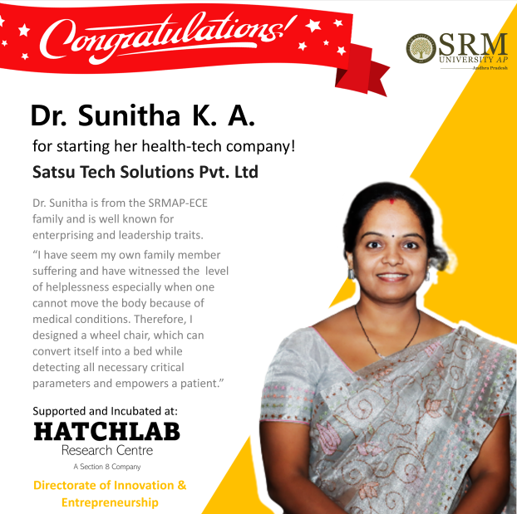
The Directorate of Entrepreneurship and Innovation steps forth with yet another brave initiative from Dr Sunitha K A, Associate Professor, the Department of Electronics and Communication Engineering. Dr Sunitha had envisioned a dream to empower patients suffering from ailments that require sustained medical assistance with a specially designed convertible wheelchair that can aid the patients in mobility and self-help. In association with Hatchlab Research Centre, Dr Sunitha has initiated a health-tech startup exclusively for patients who cannot move their bodies due to several medical conditions and to raise awareness of the continuing rise of similar cases in today’s society.
Dr Sunitha says, “The main challenge of the patient is to perform the basic movements like coming out of the bed and to sit in the wheelchair (and vice-versa), and it is almost impossible for a patient to do this simple act without external support of a person or a nurse. We have listed several such scenarios and cases where our specially designed wheelchair can be converted into a bed and can be easily controlled by the patient itself. Apart from that, all the necessary inputs like the urine levels in the drop-bag, pulse rate, emergency indicated, oxygen levels and several other parameters are well integrated into the system itself which displays in the dashboard and is communicated to the stakeholders.”
The prototype for the convertible wheelchair has been successfully tested and appreciated by doctors and experts in Chennai. With the help of Hatchlab Research Centre, the prime focus for the next few months is to create a completely functional prototype. The innovative venture plans to recreate the fully functional prototype, seed funding and round one funding from the investors, followed by large-scale production. Several multinational design patents for the product have already been filed by Dr Sunitha, and the next stage of the cohort is the commercialisation of the product.
Continue reading →


